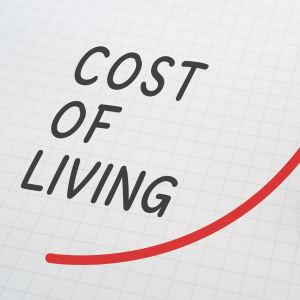
Raleigh, North Carolina, is located at the center of the Research Triangle. The city is renowned for its numerous restaurants, vibrant arts scene, and rapidly expanding tech industry. Find out how much it costs to live in Raleigh if you want to move there or just want to see how the prices compare to other places. How much does it cost to live in this lovely southern town? This guide will give you a good idea. It helps cover rent, utilities, food, and transportation. Learn about Raleigh’s business opportunities if you’re considering a move or a visit. Learn about Raleigh’s business opportunities with Fair Cash Offers For Homes if you’re considering a move or a visit.
Key Highlights
- Raleigh’s cost of living offers affordability with a balanced mix of housing, transportation, and services.
- Housing is the key expense factor, but Raleigh often has rent below the national average.
- Raleigh housing costs offer considerable value compared to cities like San Francisco and New York City.
- Key industries in Raleigh include technology, healthcare, and education, which collectively drive job growth.
- Healthcare expenses are slightly above average, but various programs offer cost management options.
Overview of Raleigh’s Cost of Living
Raleigh is situated in the heart of North Carolina and boasts a unique blend of quiet suburbia and bustling city life, making it a popular destination to visit. To figure out how much it costs to live in Raleigh, you have to look at a lot of different things, like property, transportation, and services. Compared to the rest of the country, Raleigh’s costs are a good balance between price and quality of life. People who are moving to the city or considering living there should research the various factors that influence its overall cost structure. Because of its low taxes and reasonable utility rates, Raleigh is a good place to live if you want to save money.
Factors Influencing the Cost of Living in Raleigh
The primary factors that influence the cost of living in Raleigh are rental costs, which are often the most significant. Prices for rent and homes change based on their location, such as proximity to the city center or popular neighborhoods like Cary. Although the average rent is lower than the national average, it still constitutes a significant portion of monthly expenses. The utilities are mostly in line with national standards, which makes things more predictable. Transportation is also very important because many people rely on their own cars, which means they have to pay for gas, repairs, and insurance. Additionally, public transportation often lacks sufficient options for commuting to work. Ongoing infrastructure investments may have a positive impact on future transportation costs.
Raleigh’s living costs are also influenced by healthcare and taxes. Healthcare costs are slightly higher than the national average; however, the city boasts numerous hospitals and other medical facilities, enabling patients to access high-quality care. There are also plans to make healthcare more affordable. Raleigh’s property and income taxes aren’t too high, and the city’s sales taxes are about average for all goods and services. This balance of costs makes Raleigh an appealing option for workers, families, and retirees. It also helps people make good budgets while still enjoying the city’s amenities, quality of life, and Best Things to do.
Comparing Raleigh’s Cost with Other Cities

To gain a better understanding of Raleigh’s cost of living, it is helpful to compare it with other towns in North Carolina and across the country. When compared to the national average, Raleigh’s living, utility, and service costs are comparable. When compared to places like San Francisco or New York City, where similar homes are much more expensive, housing is a great deal cheaper. Utility costs, such as water and electricity, are relatively close to the national average. This means that people can plan their monthly budgets, and it makes Raleigh a good choice for people who want stability without the chaos of places like Boston or Los Angeles.
Transportation and health care are two more examples of how affordable Raleigh is. The city’s public transportation system isn’t as extensive as those in New York or Chicago, but gas prices and car insurance rates are relatively low, so residents who drive can get to work for less money. Although the city’s healthcare prices are slightly higher than the national average, its high-quality medical services and facilities make up for it, especially when compared to other southern cities like Atlanta or Charlotte. With its reasonable prices and high-quality services, Raleigh is a city that helps its people find a good balance between their lifestyle and their budget.
Raleigh Housing Costs
Raleigh, North Carolina, offers a range of affordable housing options. There are many places for people to live. There are homes and flats for rent in Raleigh. We will compare these prices to the state average and prices in other parts of the state. If you look at how much rent and bills change every week, you can get a good idea of how much it costs to live in this fun city. Raleigh offers a variety of affordable housing options, allowing everyone to find something that suits their needs.
Best Neighborhoods for Affordable Living in Raleigh
Raleigh offers a diverse range of prices and home types, ensuring there is something for everyone. People who want to move there should look for places where prices are the lowest. As you explore the Best and Worst Neighborhoods for affordability, Knightdale and its surrounding areas stand out for having lower average home and rental prices while still offering good living conditions, family-friendly services, and a community atmosphere that values its residents. This part of Raleigh has also undergone growth and change. There are homes and apartments for less money than in the city as a whole, which makes them appealing to people who want to buy or rent their first house. North Hills is becoming more urban, but it still offers affordable options. It’s easy for people to get to downtown, parks, and neighborhood shops, and home prices are still lower than the national average. If you’re looking for a fast and simple selling option, remember that we buy houses in Raleigh, NC, and can offer quick solutions.
More than just housing, these places are affordable due to the low costs of utilities and transportation. In Raleigh, bike lanes and public transportation make it easy for people to save money on their journeys without sacrificing comfort. Families, workers, and individuals seeking affordable housing should consider Raleigh as a viable option for their housing needs. It has nice, affordable homes, and public transportation is easily accessible. The fact that these areas offer both a good quality of life and a strong economy demonstrates that the city can achieve both. This helps Raleigh’s reputation as a nice, cheap place to live.
Income and Employment in Raleigh
Many people want to live in Raleigh because it has a strong job market and offers good income opportunities. To understand how the economy influences the unique cost of living in Raleigh, it is essential to understand the structure of jobs and wages in the area. The strength of Raleigh’s economy is evident in these facts, which range from the typical income to the top industries and job openings. High wages and numerous job opportunities make Raleigh a desirable place to live for individuals seeking a fulfilling life while maintaining financial stability.
Median Income Levels in the Raleigh Area
Raleigh, North Carolina, stands out due to its rich history, friendly community, and robust economy. For example, the average household income in Raleigh is better than the national average. Due to these factors, this location is highly appealing to individuals seeking to relocate, find employment, or start a family. That’s what many schools and study centers, such as North Carolina State University and the Research Triangle Park, claim. These centers make jobs in science, technology, and healthcare more competitive. The business in Raleigh is thriving, allowing residents to earn more money than those in other areas. They can also enjoy the city’s services and way of life.
Incomes are increasing even further because the city’s economy is growing rapidly. This is especially true for investments in the technology, clean energy, and science fields. People in Raleigh earn more than the average amount of money because the city offers many well-paying jobs. Compared to salaries, the cost of living is still fair. Family units, young workers, and individuals can all lead comfortable, well-balanced lives in this area, thanks to its good job opportunities, affordable housing, and high income potential. And if you’re planning to relocate or need a quick sale, you can always sell your home for cash in North Carolina for a fast and hassle-free solution. With steady job growth, economic stability, and a high quality of life, it’s no surprise that more people continue to choose Raleigh as a place to live and thrive.
Top Industries and Job Opportunities in Raleigh

Raleigh’s economy is robust and diverse, generating a wide range of income streams. There are numerous job opportunities, and some significant companies are still expanding. Raleigh is an ideal place to generate new ideas, start your own business, or advance your career. There are numerous job openings in the city across various fields, including science, healthcare, education, and research and development (R&D). The city is known for its robust economy. They are very important for jobs because they create a lively environment where people can find safe and enjoyable work. They also help people find long-term opportunities and advance in their careers.
Big names in the tech business include Red Hat, IBM, and SAS Institute. Research Triangle Park, located nearby, is also home to both large tech companies and small, artistic ones. It’s easy to find work in healthcare due to companies like UNC Health Care and WakeMed Health & Hospitals, which are among the best in the world. Not only that, but new breakthroughs in science, drugs, and medical technology also mean that there are always new job opportunities available. North Carolina State University and other schools in the area lead education and research that create jobs in teaching, administration, and advanced research. The jobs will also have an impact on training technology, publishing, and other related services. There are also retail, government, and financial services companies in Raleigh that help to make the economy vary. There are numerous job opportunities in these areas, including public administration, banking, sales, supply chain management, and marketing. This makes the city an even more attractive place for professionals at all levels of their careers to reside.
In conclusion, the diverse range of top industries and job opportunities in Raleigh makes it an attractive destination for job seekers. Its commitment to innovation, alongside stable economic growth, ensures the city remains a beacon of career potential across North Carolina. Whether you’re a recent graduate or an experienced professional, the breadth of roles available across these industries can cater to a wide range of skill levels and career aspirations, solidifying Raleigh’s status as a city of opportunity and growth.
Health Care Expenses in Raleigh
Healthcare in Raleigh, North Carolina, costs a little more than in other cities nationwide, but the city is recognized for its excellent healthcare services. These fees are particularly important for individuals who live in or wish to move to a busy city. Raleigh is home to numerous well-known hospitals and medical centers that offer a wide range of medical services. But, as with many places, the prices can add up. The good news is that the city offers many options for individuals seeking affordable healthcare. This allows them to keep costs down while still receiving good services.
| Healthcare Option | Description | Cost Management Features | Accessibility |
|---|---|---|---|
| Public Health Insurance | Health plans are provided by companies to their employees as part of benefits packages. | Includes subsidized premiums and tailored plans for low-income residents. | Widely accessible with solutions for uninsured and underinsured residents. |
| Employer-Sponsored Insurance | Offers extensive network access with enhanced service options, albeit at a higher cost. | Cost-sharing arrangements with employers absorb some expenses, reducing individual costs. | Available to most full-time employees with simplified enrollment processes. |
| Private Health Insurance | Individually purchased plans with customizable coverage options. | Flexible premium options and deductibles to fit a variety of budgets. | Offers extensive network access with enhanced service options, though costlier. |
| Community Health Clinics | Offers extensive network access with enhanced service options, albeit at a higher cost. | Sliding fee scales based on income ensure affordability. | Widely located across Raleigh, offering walk-in services and bilingual support. |
This table provides a quick overview of the various strategies and choices that can help people in Raleigh effectively manage their healthcare costs. It shows that the city is committed to making health solutions accessible and affordable. If you require personalized guidance or assistance, please don’t hesitate to contact us.
Options for Affordable Health Care in Raleigh

Raleigh offers numerous programs, hospitals, and insurance options that make healthcare more affordable. These help people keep their prices down without lowering the quality. People, families, and children in North Carolina with low incomes can get important health insurance through Medicaid and CHIP. This significantly reduces overall costs. There are also many community health centers in Raleigh. Two examples are Alliance Medical Ministry and Urban Ministries of Wake County. The services at these centers are based on a sliding scale, with a focus on preventive care and the treatment of long-term illnesses. Individuals without insurance or those with insufficient coverage can access regular, low-cost medical care at these centers. This is a crucial aspect of maintaining community health. Currently, Raleigh’s private insurance market is highly competitive, with each plan offering its own rates and deductibles. Many companies also offer comprehensive health benefits, making insurance more affordable. As if that weren’t enough, tools like HSAs and FSAs enable individuals to save money on taxes and plan ahead for their medical expenses throughout the year.
In addition to these financial resources, Raleigh’s healthcare system has also implemented new, more affordable ways to make care more accessible. Telemedicine, which allows patients to consult with doctors online, is being increasingly used by more people. There is less need for people to go to the doctor’s office for regular care. This saves them time and money on travel. Some people believe that healthcare costs in Raleigh are slightly higher than those nationwide. These new service models help to change that view. Many people in Raleigh can access the healthcare they need and afford. There are free and low-cost clinics, as well as various insurance options and employer-sponsored plans. Both newcomers and long-time residents find that the city’s mix of low cost, easy access, and high quality makes it an even more appealing place to live a healthy life without incurring excessive expenses.
No matter your situation, whether you are dealing with liens, facing foreclosure, or simply need to sell quickly, Fair Cash Offers For Homes provides a reliable and straightforward solution to help you move forward with confidence. Curious how we can help? Contact us at (919) 551-8506 today!
FAQs:
What factors contribute to the cost of living in Raleigh?
The cost of living in Raleigh is influenced by various factors, including housing, utilities, transportation, healthcare, and taxes. Housing is the most significant expense, while utilities tend to align with national averages. Transportation costs are also crucial, as many people rely on personal vehicles due to limited public transportation options.
How does Raleigh’s housing cost compare to other major cities?
Raleigh’s housing costs are more affordable compared to cities like San Francisco and New York City. The rent and house prices typically sit below the national average, making it an attractive option for new residents.
What industries contribute to job growth in Raleigh?
Key industries in Raleigh include technology, healthcare, and education. Companies in these sectors offer numerous job opportunities, significantly contributing to the city’s robust economic landscape.
Are there affordable healthcare options available in Raleigh?
Yes, Raleigh offers several affordable healthcare options, such as Medicaid, the Children’s Health Insurance Program (CHIP), and community health centers with sliding fee scales. Private insurance is also competitive, offering a range of plans tailored to different needs.
What transportation options influence living costs in Raleigh?
While Raleigh’s public transportation is limited compared to larger cities, the city offers relatively low gas prices and modest car insurance rates, making personal vehicle use affordable. Future infrastructure investments may further improve commuting options.
Helpful Raleigh Blog Articles
● Selling An Inherited House In Raleigh, NC
● Sell A Foreclosed Home In Raleigh, NC
● Selling Your Raleigh, NC Home In Poor Condition
● Sell A Fire-Damaged House In Raleigh, NC
● Cost To Sell A House In Raleigh, NC
● Selling A Fixer-upper Home In Raleigh, NC
● Tax Responsibilities When Selling A House In Raleigh, NC
● Can You Sell a House with a Lien in Raleigh, NC
● How Long After an Appraisal Can You Close in Raleigh, NC
● Can the Executor of a Will Sell Property in Raleigh, NC?
● Best Things to Do in Raleigh, NC, With Kids
● How Long After an Appraisal Can You Close in Raleigh, NC

